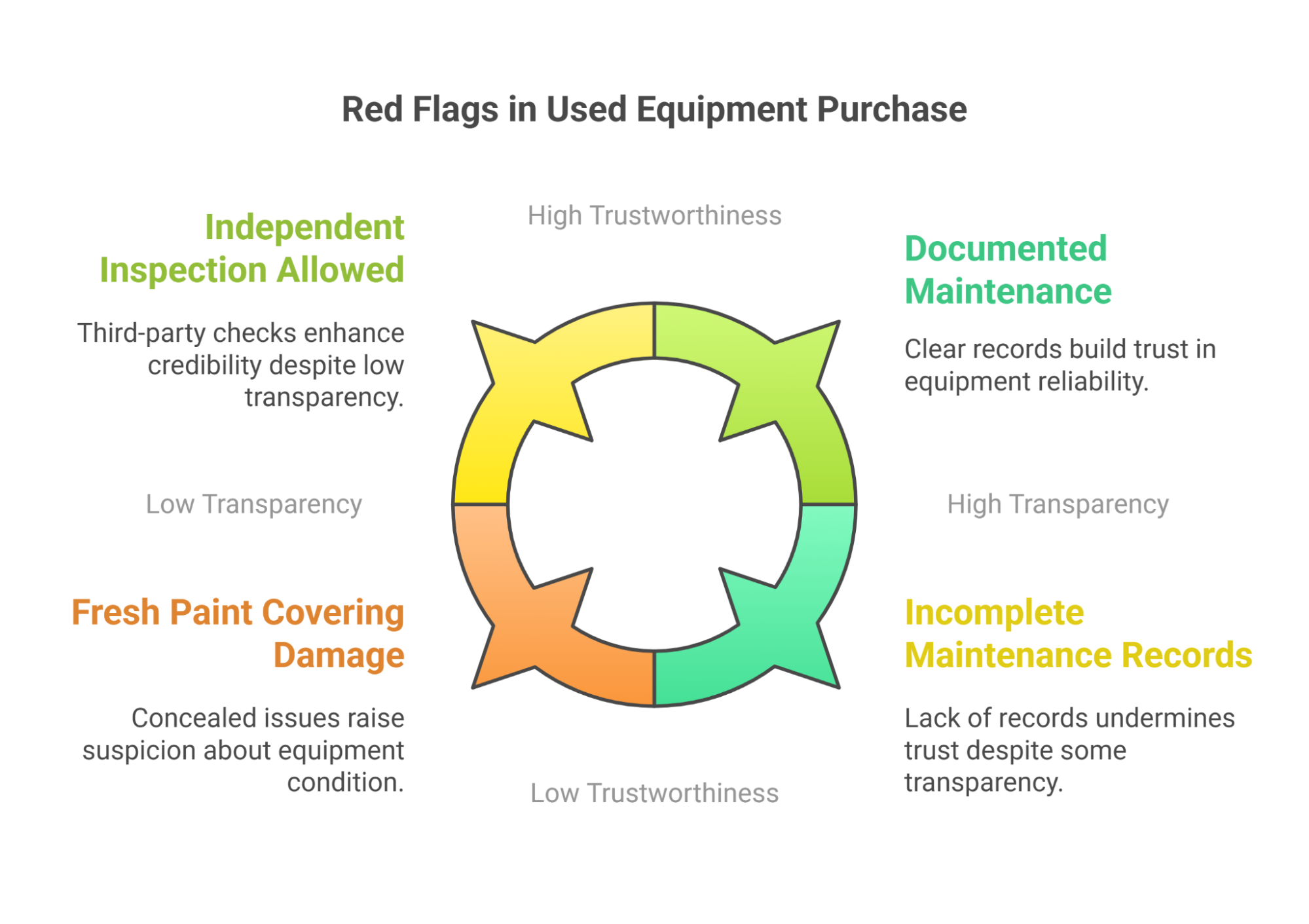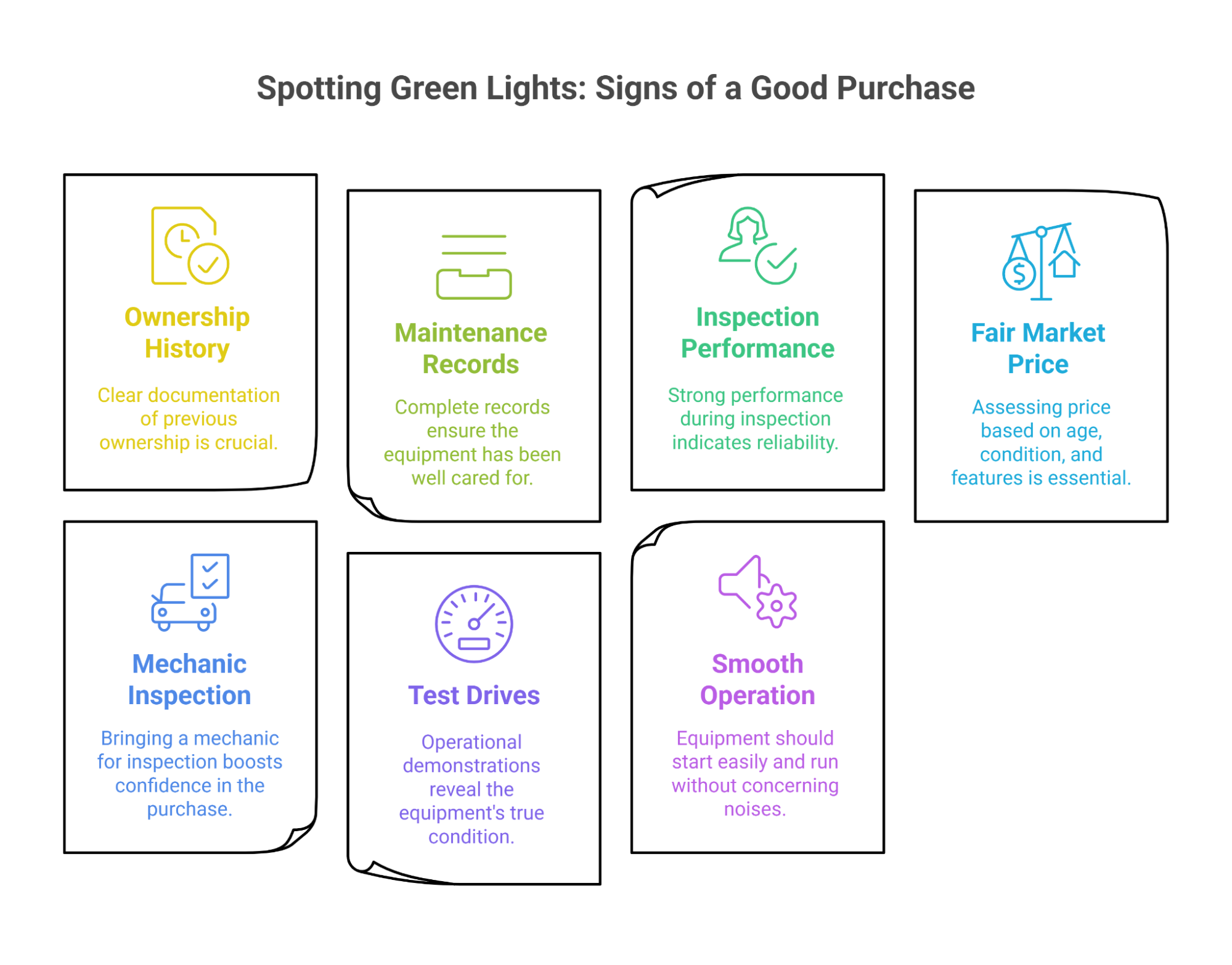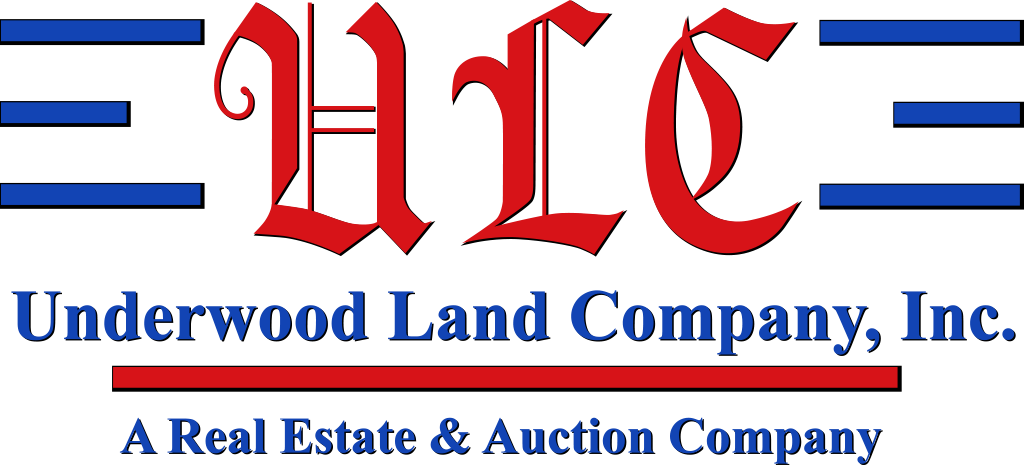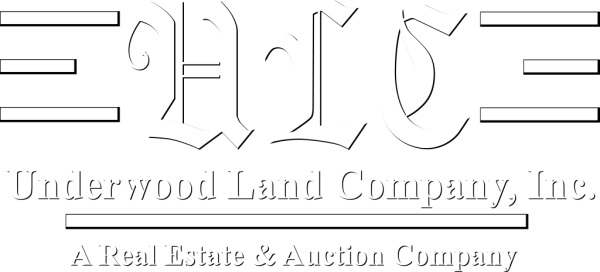Red Flags & Green Lights: What Alabama Farmers Need to Check Before Buying Used Equipment

Buying used farm equipment can save you money but also comes with risks.
A thorough inspection, mechanical history review, and professional evaluation are essential before purchasing any pre-owned agricultural machinery.
Making smart choices about used equipment helps protect your investment and keeps your farm running smoothly.
[A farmer inspects a used tractor, checking for red flags and green lights, such as rust, wear and tear, and proper functioning parts]
Smart farmers know the value of getting the right equipment at the right price.
The used market offers many options, from tractors to implements, but each potential purchase needs careful consideration.
Operating farm equipment on Alabama roadways and fields requires safe and reliable machinery.
Checking equipment paperwork is just as important as examining the machinery itself. Before making a purchase, you should verify ownership, maintenance records, and any liens.
Key Takeaways
- Inspect all equipment thoroughly and review maintenance records before purchasing.
- Document the seller's claims and get professional evaluations for major purchases.
- Check legal requirements and verify ownership status through proper documentation.
Understanding the Importance of Equipment Condition

The quality of used farm equipment directly impacts your farm's productivity, safety, and financial health.
A thorough inspection can save you thousands in repair costs and prevent dangerous breakdowns during critical farming operations.
Why Equipment Quality Matters
When you're investing in used farm equipment, every detail matters. Operating faulty equipment on roadways can lead to accidents and legal issues, even with farming exemptions.
Take time to check these critical areas:
- Engine performance and emissions
- Hydraulic systems
- Transmission functionality
- Structural integrity
- Safety features and warning lights
Your equipment needs to work reliably during peak seasons. A breakdown during harvest can cost you more than just repair bills - it can threaten your entire crop yield.
Identifying Red Flags: When to Be Cautious

Being alert to warning signs when buying used farm equipment can save you thousands of dollars and countless hours of future headaches. A careful inspection now protects your investment and farm operations later.
Overview of Red Flags
Pay close attention to these key warning signs during your equipment inspection. Missing or inconsistent documentation often signals bigger problems ahead.
Common Red Flags:
- Seller unable to demonstrate all functions
- Incomplete maintenance records
- Fresh paint covering potential rust or damage
Mismatched or missing serial numbers
Unwillingness to allow independent inspection
Watch out for sellers who seem rushed or pressure you to make a quick decision. Take your time to check everything thoroughly.
Maintenance & Repair History
A well-documented maintenance history shows that the previous owner properly maintained the equipment. Ask for service records and receipts.
Key Documentation to Request:
- Oil change records
- Filter replacements
- Major repairs
- Regular service intervals
- Parts replacement history
Be wary if the seller claims they "lost the records" or only has a verbal maintenance history. This could mean irregular upkeep or hidden problems.
Physical Condition
Look beyond surface appearance when examining equipment. Fresh paint might hide serious issues.
Critical Areas to Inspect:
- Engine compartment for leaks or repairs
- Frame for cracks or welds
- Tire wear patterns
- Hydraulic system function
- Electronic systems and displays
Test every function yourself. During operation, strange noises, vibrations, or smoke are serious warning signs of distress.
Previous Ownership Issues
Research the equipment's history before purchase. Multiple owners in a short period might indicate recurring problems.
Questions to Ask:
- Why is the owner selling?
- How long have they owned it?
- What tasks was it used for?
- Where was it stored?
- Are there any liens?
Look up the serial number to verify ownership and check for theft reports.
"Nearly 60% of major equipment failures could have been prevented by spotting early warning signs during pre-purchase inspection," says Johnson, certified equipment appraiser.
Don't skip professional inspection on major purchases. A qualified mechanic can spot hidden red flags that might not be obvious to untrained eyes.
Getting an independent assessment costs far less than replacing a failed transmission or engine.
Ready to invest in reliable farm equipment? Underwood Land Company’s expert Farm Auction services help Alabama farmers find quality machinery at unbeatable prices. Don’t miss your chance—explore our auctions today!
Spotting Green Lights: Signs of a Good Purchase

Certain positive signals can help you make smart buying decisions when shopping for used farm equipment in Alabama.
Looking for these green lights helps protect your investment and ensures you get reliable machinery for your operation.
Overview of Green Lights
Green flags in purchasing include clear ownership history, complete maintenance records, and strong performance during inspection.
It is essential to determine a fair market price based on the equipment's age, condition, and features. Be extra confident when the seller allows you to bring your mechanic for inspection.
Test drives and operational demonstrations show the seller has nothing to hide. Watch for equipment that starts easily and runs smoothly without concerning noises.
Documented Maintenance
Regular service records are worth their weight in gold. Ask for detailed maintenance logs showing oil changes, filter replacements, and repairs.
Digital records or organized paper files indicate a meticulous owner. Look for receipts from certified mechanics and dealership service departments.
Original manuals and warranty documents add significant value. Bonus points if the seller has spreadsheets tracking maintenance costs and service intervals.
Physical & Operational Excellence
Clean equipment often reflects good care. Check for fresh paint only where needed - complete repaints might hide problems.
Watch for:
- Even tire wear
- Minimal rust or corrosion
- Tight steering and controls
- Smooth hydraulic operation
- No concerning fluid leaks
- Clean engine compartment
Test all functions multiple times under different conditions. Equipment that performs consistently shows reliable maintenance.
Reputable Ownership & Recommendations
Local sellers with good reputations are ideal partners. Ask other farmers in your area about their experiences with the seller.
Equipment from established farms often receives better care. Look for sellers who can explain their maintenance practices and reasons for selling.
Professional dealers should provide references from satisfied customers. Check online reviews and ask about return policies or warranties.
Visual Cues
Positive Signs:
- Level wear on moving parts
- Clean fluid samples
- Updated safety features
- Organized storage
- Protected from weather
Watch how the seller demonstrates the equipment. Confident operators who know their machinery well typically maintain it properly.
Look for matching tire sets and even wear patterns. The original paint is in good condition, suggesting minimal exposure to harsh conditions.
Spot a great deal? Make sure it’s the right one. Underwood Land Company’s Farm Sales experts are here to guide you through every step, ensuring your next equipment purchase is a wise investment. Contact us now!
Practical Inspection Tips & Checklist
A thorough inspection can save you thousands of dollars and countless headaches when buying used farm equipment.
These proven steps and checklists will help you spot potential problems before purchasing.
Step-by-Step Inspection Guide
Start your inspection in bright daylight. You need good visibility to spot wear and damage.
First, check the engine. During startup, look for blue exhaust smoke—this signals oil-burning issues. Then, listen for odd knocks or ticks.
Test all controls and gauges. Every switch, lever, and button should work smoothly. Check that warning lights function properly.
Examine the hydraulic system carefully. Watch for leaks around hoses and fittings. Hydraulic fluid should be clean, not cloudy or dark.
Look at wear points like hitches, PTO shafts, and tire treads. Uneven wear might mean alignment problems.
A local Alabama farmer once told us about the time he bought a tractor that seemed perfect—until it broke down a week later, costing him thousands in repairs. If only he had a solid checklist to follow before signing the papers.
To help you avoid similar pitfalls, we’ve crafted a detailed Used Farm Equipment Buying Checklist that covers everything from paperwork to operational tests.
Use it on your next purchase to protect your investment and your farm’s future
Used Farm Equipment Buying Checklist
| Section | Action Item | Check |
1. Documentation Review | Verify proof of ownership and check for any liens | ☐ |
Review maintenance records (oil changes, repairs, part replacements) | ☐ | |
Check for equipment manuals and warranty documents. | ☐ | |
Confirm serial numbers match the paperwork and machine. | ☐ | |
Research previous ownership history and reasons for selling. | ☐ | |
2. Physical Inspection | Check for rust, corrosion, or fresh paint masking damage. | ☐ |
| Examine the engine for leaks, unusual noises, or smoke. | ☐ | |
| Inspect hydraulic systems for clean fluid and leak-free hoses. | ☐ | |
| Look for frame cracks, welds, or signs of structural repair. | ☐ | |
| Assess tire condition for even wear and matching sets. | ☐ | |
| Test fluid levels (oil, coolant, hydraulic) for contamination. | ☐ | |
| Review battery health and ensure proper charge. | ☐ | |
| 3. Operational Test | Conduct cold and hot starts to evaluate engine reliability | ☐ |
| Test transmission through all gears for smooth shifting | ☐ | |
| Operate hydraulic functions (lifts, buckets, implements) | ☐ | |
| Check brakes, steering, and suspension for responsiveness. | ☐ | |
| Verify lights, gauges, and electronic displays are functional. | ☐ | |
| Inspect the PTO shaft and implement connections. | ☐ | |
| 4. Maintenance Red Flags | Incomplete or missing maintenance records | ☐ |
| Fresh paint hiding rust or damage | ☐ | |
| Leaking fluids from the engine, hydraulics, or brakes | ☐ | |
| Odd noises, excessive vibrations, or smoke during the operation | ☐ | |
| Multiple past owners in a short timeframe | ☐ | |
| 5. Green Lights to Seal the Deal | Complete maintenance records with receipts | ☐ |
| Smooth engine performance and clean fluid samples | ☐ | |
| Minimal wear on tires, belts, and moving parts | ☐ | |
| Responsive hydraulics with no leaks | ☐ | |
| Well-maintained exterior with minor cosmetic flaws only | ☐ | |
| Seller allows independent inspection by a trusted mechanic. | ☐ | |
| 6. Professional Evaluation | Hire a certified mechanic for a thorough inspection | ☐ |
| Request a compression test and diagnostic scan. | ☐ | |
| Ask local equipment dealers about pre-purchase inspection services. | ☐ | |
| 7. Final Steps Before Purchase | Negotiate based on findings from the inspection | ☐ |
| Verify ownership title and finalize all legal paperwork. | ☐ | |
| Discuss warranty options or return policies if available. | ☐ | |
| Confirm the equipment meets your farm’s specific needs. | ☐ | |
Call for Professional Help
Some issues need expert eyes. Professional equipment inspectors can spot problems you might miss.
A certified mechanic can do compression tests and diagnostic scans. These tests reveal hidden engine and electrical problems.
Local equipment dealers often offer pre-purchase inspection services. They know common failure points for specific makes and models.
Consider the inspection cost as insurance against buying problem equipment. A $200 inspection could prevent a $20,000 mistake.
Conclusion
Smart equipment buying decisions protect your farm's financial health and operational success.
A methodical approach to used equipment inspection helps you avoid costly mistakes and find reliable machinery for your Alabama farm.
Always check equipment service records and maintenance history before purchase. Look for recent farm relief programs that might help with financing options.
Inspect for rust, wear patterns, and fluid leaks - these tell the true story of machine health. Test all systems during operation, not just when idle.
Document everything with photos and notes during the inspection. Get a trusted mechanic's opinion on major purchases.
Remember to verify ownership and liens before making any payments. Equipment warranties and return policies need careful review.
Focus on finding equipment that matches your farm's specific needs and operational scale.
Don’t gamble on used farm equipment. Trust Underwood Land Company’s Farm Auction services to connect you with the best deals in Alabama. Contact us today and buy with confidence!
Frequently Asked Questions
What should I check before buying used farm equipment?
Before buying used farm equipment, inspect the machine’s maintenance records, look for signs of wear and rust, check fluid levels, test the equipment’s operation, and verify the working condition of critical components like hydraulics, tires, and belts.
How do I know if used farm equipment is a good deal?
A good deal on used farm equipment includes well-documented maintenance records, minimal wear, smooth operation during a test run, and a price that aligns with the equipment’s age, condition, and market value. Comparing multiple listings can help determine fair pricing.
What are common red flags when buying used farm machinery?
Common red flags include missing service records, excessive rust or corrosion, leaking fluids, strange noises during operation, and inconsistent performance. Equipment with multiple past owners or signs of neglect should also raise concerns.
Is it better to buy used or new farm equipment?
Buying used farm equipment is often more cost-effective, especially for well-maintained machinery with a solid track record. New equipment offers the latest technology and warranties but comes at a higher cost. The decision depends on budget, needs, and usage frequency.
How many hours is too much for used farm equipment?
5,000–7,500 hours is considered high for most used tractors and farm equipment. However, well-maintained equipment can last longer. Always review maintenance records and conduct a thorough inspection to assess how wear correlates with hours used.
What is the best time of year to buy used farm equipment?
The best time to buy used farm equipment is during the off-season, typically late fall and winter. During these months, demand is lower, and sellers may offer better deals as they look to clear inventory.
Should I hire an expert to inspect used farm equipment before buying?
Yes, hiring a qualified mechanic or equipment specialist can help identify hidden issues that might not be visible during a basic inspection. This extra step can prevent costly repairs and ensure you make a sound investment.



